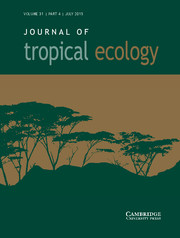Crossref Citations
This article has been cited by the following publications. This list is generated based on data provided by
Crossref.
Styring, Alison R.
and
Ickes, Kalan
2001.
Woodpecker Participation in Mixed Species Flocks in Peninsular Malaysia.
The Wilson Bulletin,
Vol. 113,
Issue. 3,
p.
342.
Francis, Charles M.
and
Wells, David R.
2003.
Pasoh.
p.
375.
Styring, Alison R.
and
Ickes, Kalan
2003.
Pasoh.
p.
547.
DeWalt, Saara J.
Maliakal, Satya K.
and
Denslow, Julie S.
2003.
Changes in vegetation structure and composition along a tropical forest chronosequence: implications for wildlife.
Forest Ecology and Management,
Vol. 182,
Issue. 1-3,
p.
139.
LAMMERTINK, MARTJAN
2004.
A Multiple‐Site Comparison of Woodpecker Communities in Bornean Lowland and Hill Forests.
Conservation Biology,
Vol. 18,
Issue. 3,
p.
746.
Dale, Svein
and
Slembe, Bjørnar
2005.
Effects of selective logging (50 years ago) on habitat use and ranging behaviour of a forest understorey bird (red‐tailed bristlebill, Bleda syndactyla) in Uganda.
African Journal of Ecology,
Vol. 43,
Issue. 2,
p.
114.
OJEDA, VALERIA S.
SUAREZ, M. LAURA
and
KITZBERGER, THOMAS
2007.
Crown dieback events as key processes creating cavity habitat for magellanic woodpeckers.
Austral Ecology,
Vol. 32,
Issue. 4,
p.
436.
Lammertink, Martjan
Prawiradilaga, Dewi M.
Setiorini, Utami
Naing, Thet Zaw
Duckworth, J.W.
and
Menken, Steph B.J.
2009.
Global population decline of the Great Slaty Woodpecker (Mulleripicus pulverulentus).
Biological Conservation,
Vol. 142,
Issue. 1,
p.
166.
Sheldon, Frederick H.
Styring, Alison
and
Hosner, Peter A.
2010.
Bird species richness in a Bornean exotic tree plantation: A long-term perspective.
Biological Conservation,
Vol. 143,
Issue. 2,
p.
399.
Kumar, Raman
and
Singh, Pratap
2010.
Determining woodpecker diversity in the sub-Himalayan forests of northern India using call playbacks.
Journal of Field Ornithology,
Vol. 81,
Issue. 2,
p.
215.
Sodhi, Navjot S.
Koh, Lian Pin
Clements, Reuben
Wanger, Thomas C.
Hill, Jane K.
Hamer, Keith C.
Clough, Yann
Tscharntke, Teja
Posa, Mary Rose C.
and
Lee, Tien Ming
2010.
Conserving Southeast Asian forest biodiversity in human-modified landscapes.
Biological Conservation,
Vol. 143,
Issue. 10,
p.
2375.
Kumar, Raman
Shahabuddin, Ghazala
and
Kumar, Ajith
2011.
How good are managed forests at conserving native woodpecker communities? A study in sub-Himalayan dipterocarp forests of northwest India.
Biological Conservation,
Vol. 144,
Issue. 6,
p.
1876.
Styring, Alison R.
Ragai, Roslina
Unggang, Joanes
Stuebing, Robert
Hosner, Peter A.
and
Sheldon, Frederick H.
2011.
Bird community assembly in Bornean industrial tree plantations: Effects of forest age and structure.
Forest Ecology and Management,
Vol. 261,
Issue. 3,
p.
531.
Koh, Lian P.
Kettle, Chris J.
Sheil, Douglas
Lee, Tien M.
Giam, Xingli
Gibson, Luke
and
Clements, Gopalasamy R.
2013.
Encyclopedia of Biodiversity.
p.
217.
Koh, Lian P.
Kettle, Chris J.
Sheil, Douglas
Lee, Tien M.
Giam, Xingli
Gibson, Luke
and
Clements, Gopalasamy R.
2013.
Encyclopedia of Biodiversity.
p.
509.
Kumar, Raman
Shahabuddin, Ghazala
and
Kumar, Ajith
2014.
Habitat Determinants of Woodpecker Abundance and Species Richness in Sub-Himalayan Dipterocarp Forests of North-West India.
Acta Ornithologica,
Vol. 49,
Issue. 2,
p.
243.
Costantini, David
Edwards, David P.
and
Simons, Mirre J.P.
2016.
Life after logging in tropical forests of Borneo: A meta-analysis.
Biological Conservation,
Vol. 196,
Issue. ,
p.
182.
Shakya, Subir B.
Fuchs, Jérôme
Pons, Jean-Marc
and
Sheldon, Frederick H.
2017.
Tapping the woodpecker tree for evolutionary insight.
Molecular Phylogenetics and Evolution,
Vol. 116,
Issue. ,
p.
182.
Limparungpatthanakij , Wich'yanan
and
Sly, Nicholas D.
2023.
Birds of the World.
Shafie, Nur Juliani
Anuar, Habibah
David, Gertrude
Ahmad, Amirrudin
and
Abdullah, Mohd Tajuddin
2023.
Bird species composition, density and feeding guilds in contrasting lowland dipterocarp forests of Terengganu, Peninsular Malaysia.
Tropical Ecology,
Vol. 64,
Issue. 2,
p.
238.




